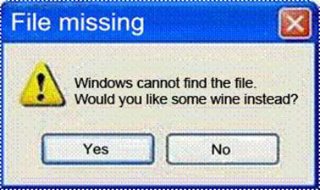No Risk of Satisfaction Paradox Yet
 I chuckled reading a post by Wired founding editor Kevin Kelly, about what is known as The Satisfaction Paradox. While Amazon and Netflix get better at anticipating my entertainment preferences every day, for work I am so far from being at risk of the hypothetical circumstance he described:
I chuckled reading a post by Wired founding editor Kevin Kelly, about what is known as The Satisfaction Paradox. While Amazon and Netflix get better at anticipating my entertainment preferences every day, for work I am so far from being at risk of the hypothetical circumstance he described:
What if you lived in a world where everything around you was just what you wanted?… In theory, you would not choose since it does not matter. Leave it to serendipity, since every option is wonderful. If your filtering/recommendation system really is working, then anything you accept from them should be satisfying.
Wish List Technologies
Although by most standards my scanning, filtering and recommendation system is efficient, (if not obsessive), this occasional geek has no difficulty coming up with a wish list of 5 desired technologies that have yet to cross my radar — and that frustrate me on a regular basis by their non-existence.
- Smart project management-to-calendar synchronization. Ideally, I’m yearning for an add-on that’s compatible with my preferred Gantt chart tool and my personal calendar. (For me, that would be the Google app, Smartsheet, and MS Outlook for Mac.) I’m not after manual batch updates; I need smart look up and synchronization. For example, if the milestone for this project shifts, when is the next open date on my calendar? OK, now please book that and repeat for dependent tasks.
- Password/security software for complex lives. LastPass is the best of the password software services I’ve used yet, but I still need to resort far too often to that good old multi-page Excel file of logins and passwords I’ve had for years. It is simply too cumbersome to maintain multiple profiles. For example, logging in to various social media networks or Google accounts for multiple clients or family members can be a frustrating daily experience.
- Social media bar ban. I want to ban those ‘sharing’ bars that pop-up on the side or sometimes at the top or bottom of the screen. I despise these and leave the offending site when possible, but if it’s a site I must use for a client why should I have to turn them off or delete them each time? I cannot completely turn off pop-up functionality, but would certainly appreciate ‘teaching’ my browser to ignore those sharing bars.
- Multimedia capture and transcribe. The Evernote software and app are getting close to this, yet it’s still not as seamless as it could be to take photos, record audio, convert to text, and import the resulting files into whatever I want to continue working in. For a while it looked as if I was just about there in Evernote, but then (among others) the New York Times changed its print format so I can no longer capture and store clean versions of articles I want to save for reference. The challenge is to reduce the number of steps and conversions needed so the technology doesn’t get in the way of what is usually a desire for a quick history or memory jog. (For publishers out there, I am a paid subscriber to valued publications. I simply want to be able to “electronically clip and save” articles just as I did physical copies for years.)
- Helpful error messages. Thankfully, I am usually working on a Mac or iPhone, which means my exposure to error messages is less than it is for many people. But whatever your tool of choice is, error messages are rarely helpful – not to mention the galling lack of acknowledgment of your frustration. Here’s to universally helpful error messages like this Windows sample sent by a friend.
Priorities
I listed these 5 technologies in order of my personal priorities. While I understand that certain multi-million dollar, enterprise-level software service packages may offer some of this functionality, what I’m seeking is a touch of “technology satisfaction paradox” for the rest of us. What would you add to this wish list?
Note: Although the resulting behavior, or inaction, may look the same, the Satisfaction Paradox is quite different from what is referred to as the Paradox of Choice, where an overwhelming array of choices leads to indecision.
—–
photo licensed via flickr, Some Rights Reserved: Nicole Pierce



